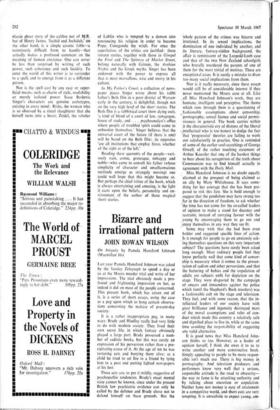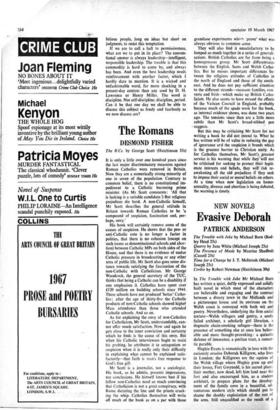Bizarre and irrational pattern
JOHN ROWAN WILSON
Last year Pamela Hansford Johnson was asked by the Sunday Telegraph to spend a day or so at the Moors murder trial and write of her impressions. The trial obviously made a pro- found and frightening impression on her, as indeed it did on most of the people concerned. This present book, which has arisen out of it, is a series of short essays, using the case as a peg upon which to hang certain observa- tions concerning the malaise of present-day society.
It is a rather inappropriate peg, in many ways. Brady and Hindley really had very little to do with modern society. They lived their own secret life, in which fantasy obviously played a large part. Brady possessed a num- ber of sadistic books, but this was surely an expression of his perversion rather than a pre- cipitating cause of it. At the age of ten he was torturing cats and burying them alive; as a child he tried to set fire to a friend by tying him to a post and putting lighted newspapers at his feet.
These acts are, to put it mildly, suggestive of psychopathic tendencies. Brady's exact mental state cannot be known, since under the present British law psychiatric evidence can only be called by the defence and Brady chose not to defend himself on these grounds. But the 'whole pattern of the crimes was bizarre and irrational. In its sexual implications, the domination of one individual by another, and its literary, fantasy-ridden background, the affair is reminiscent of the Leopold-Loeb case and that of the two New Zealand schoolgirls who brutally murdered the parents of one of them for the most trivial of motives. These are exceptional cases. It is surely a mistake to draw too many social implications from them.
Nor is it really necessary, since these essays would still be of considerable interest if they 'never mentioned the Moors case at all. Like all Miss Hansford Johnson's work, they are :humane, intelligent and perceptive. The theme which runs through them is a questioning of fashionable assumptions about censorship, ,pornography, sexual licence and social permis- .siveness in general. The book carries within it the characteristic cry of distress of the liberal 7. intellectual who is too honest to dodge the fact tthat 'progressive' theories are failing to work out satisfactorily in practice. One is reminded of some of the earlier soul-searchings of George Orwell, of the rather touching statement of Arthur. Koestler that one of the hardest things to bear about his recognition of the truth about 'Communism was to find himself actually in agreement with the Daily Mail.
Miss Hansford Johnson is no doubt equally alarmed at the prospect of being claimed as an ally by Mary Whitehouse. It says some- thing for her courage that she has been pre- pared to risk this fate. She is bold enough to suggest that the pendulum may have swung too 'far in the direction of freedom, to ask whether /the time has not come for the so-called leaders of opinion to make a stand for decency and restraint, instead of currying favour with the young by encouraging them to go out and
• enjoy themselves in any way they see fit.
Some may wish that she had been even bolder and suggested specific lines of action. Is it enough for people to go on anxiously ask- ing themselves questions on this very important subject? The questions have surely been asked long enough. Most ordinary people feel they know perfectly well that some kind of censor- ship is necessary when it comes to the presen- tation of sadism and other perversions, and that the battering of babies and the copulation of adults are subjects unfit for depiction on the stage. They were disgusted by the campaign of smears and innuendoes against the police which (until the Shepherd's Bush murders) was a fashionable cult on the stage and television. They feel, and with some reason, that the in- tellectual leaders of our society have with great brilliance and ingenuity destroyed most of the moral assumptions and rules of con- duct which made this country a relatively safe and dignified place to live in, while at the same time avoiding the responsibility of suggesting any valid alternative.
It is good news that Miss Hansford John- son thinks so too. However, as a leader of opinion herself, I think she owes it to us to write another and more constructive book. Simply appealing to people to be more respon- sible isn't much use. There is big money in pornography. And television producers and performers know very well that a serious, responsible attitude is the road to obscurity— the way to fame is by attacking authority and by talking about excretion or copulation. Neither fame nor money is easy of attainment in a competitive world, and short cuts are very tempting. It is unrealistic to expect young, am-
bitious people, long on ideas but short on judgment, to resist this temptation.
If we are to call a halt to permissiveness, what are we to put in its place? The conven- tional answer is always leadership—intelligent, responsible leadership. The trouble is that this commodity is hard to come by, and always has been. And even the best leadership needs reinforcement with another factor, which I hardly dare to mention. It is a wicked and unfashionable word, far more shocking in a present-day context than any used by D. H. Lawrence or Henry Miller. The word is discipline. Not self-discipline; discipline, period. Can it be that one day we shall be able to discuss this subject as freely and fearlessly as we now discuss sex?































 Previous page
Previous page